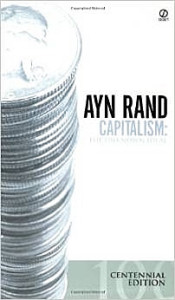 Today’s quote comes from Ayn Rand’s essay “America’s Persecuted Minority: Big Business” from Capitalism: The Unknown Ideal. Leading up to this quote, she describes what economic and political power are and in this quote defines the difference between them.
Today’s quote comes from Ayn Rand’s essay “America’s Persecuted Minority: Big Business” from Capitalism: The Unknown Ideal. Leading up to this quote, she describes what economic and political power are and in this quote defines the difference between them.
Now let me define the difference between economic power and political power: economic power is exercised by means of a positive, by offering men a reward, an incentive, a payment, a value; political power is exercised by means of a negative, by the threat of punishment, injury, imprisonment, destruction. The businessman’s tool is values; the bureaucrat’s tool is fear.
Even in areas where some may claim the government is offering a reward, they are in fact threatening punishment. Take as an example a state offering subsidies for installing solar panels. In Vermont I believe it is a 30% credit, not a deduction but a credit, of the price of the system. With that in mind let us imagine, for the sake of simplicity, that there are just two tax payers in Vermont. They both make $50,000 a year and both pay 10% in taxes. These taxes provide the full operating budget of $10,000 for the state. All pretty straightforward.
Now imagine that tax payer 2 decides to install a $10,000 solar array and receives the $3000 credit on his taxes. If everything stayed the same tax payer 1 would still be paying $5000 while tax payer 2 would, after his credit, only be paying $2000, which may seem like tax payer 2 has received a value while tax payer 1 is no better or worse off than before, just as you might expect in a voluntary trade. The problem of course is that now the state is only collecting $7000 in taxes to pay for a budget of $10000, which obviously won’t work. To solve this problem everyone’s tax rate needs to go up to make up the shortfall. In this simplified example this means the tax rate goes from 10% to 13%, meaning that tax payer 1 is now paying $6500 in taxes, worse off by $1500, and tax payer 2 is paying $3500, $6500 minus the $3000 in credits, only actually “saving” $1500.
So what at first looks like a benefit, and even that is not really what it is made out to be, is really just a threat. “Install solar panels or we’ll take more of your money to pay for those that do.” This is hardly what happens in a voluntary trade. Apple doesn’t take money from me when I don’t buy an iPhone and give it to those who do. Nor does White Market, a local grocery store, send me a bill when I shop at Price Chopper instead.
The real situation is much more complicated, involving multiple subsidies and many more people, but this is the essential nature of any subsidy: some people, those who cannot or will not take advantage of the subsidy, are sacrificed to others, those who do take advantage of it. In the best case scenario everyone takes the subsidy and nobody is any better or worse off, making the subsidy pointless. Of course, the government’s trick is that there is no subsidy that everyone can take advantage of, so there will always be sacrificial victims.

Pingback: Self-Interest versus Public Interest - Quote of the Day - Order From Chaos